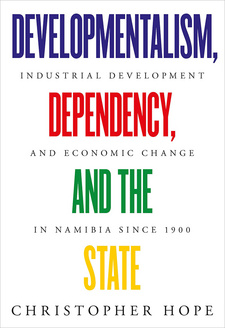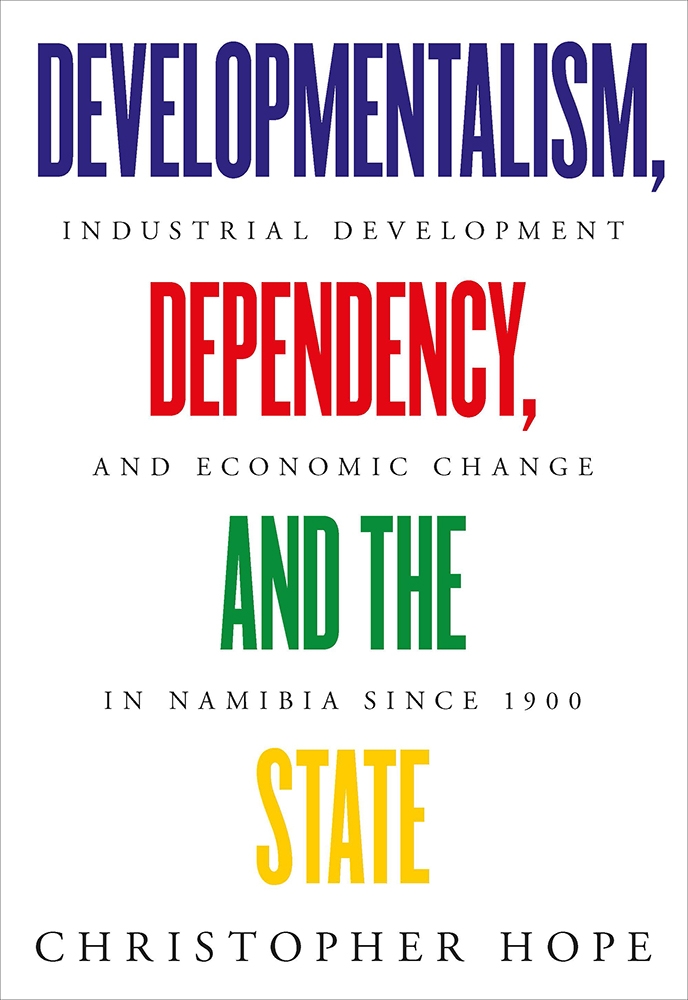Developmentalism, Dependency, and the State: Industrial Development and Economic Change in Namibia since 1900, by Christopher Hope

Developmentalism, Dependency, and the State: Industrial Development and Economic Change in Namibia since 1900, by Christopher Hope. Basler Afrika Bibliographien. Basel, Switzerland 2020. ISBN 9783906927213 / ISBN 978-3-906927-21-3
Developmentalism, Dependency, and the State: Industrial Development and Economic Change in Namibia since 1900, by Christopher Hope. The author undertook his doctorate in Development Studies at the University of Cambridge, UK (2014-2019).
[...] The argument of the study is that, whilst industrial development in Namibia has been affected by a host of 'economic' factors (such as a small domestic market, distance to major markets, etc.), progress has been fundamentally constrained by a lack of state support to the sector and by actions from international actors which have thwarted efforts towards structural transformation of the economy. In the colonial era, the state was willing to intervene in the economy to support the economically influential farmers of the country but was unwilling to support its industrialists. The lack of state support exacerbated the issues for the manufacturing sector caused by competition from South African firms who, due to free access to Namibia's market owing to the country's status as a South African colony, were to entirely overrun Namibian firms. In comparison, the most remarkable feature of industrial development in Namibia since independence is its continuity with the colonial era. Again, one can see how the influence of Namibia's leading economic actors (particularly in the mining and trading sectors) have stood in opposition to structural transformation, and the evident lack of commitment from the state to achieving industrial development. More so in the independence era, the influence of international political economy factors in both shaping the attitude of the Namibian state to industrial policy and in undermining efforts towards industrial policy is stark. The following study is in part historical: charting the course and causes of industrial and economic development in Namibia over the 20th and 21st centuries, and in part contemporary: studying current issues in industrial and economic development in the country. Both elements of the study can be seen to reflect present trends in economic research. The first is the renewed interest in industrial policy in Africa today and the second is to so-called 'renaissance of African economic history (discussed later in this chapter). My hope is that this book can serve as a useful resource for students interested in the study of the Namibian economy providing, as it does, rarely seen data and information, as well as new theories on the country's economy. But before launching into the historical narrative, it is first necessary to outline some of the thinking and previous research which underpins this study.
Industrial development as the driver of economic development
Industrial development, as understood in this research, refers to the structural transformation of the economy that sees increased levels of manufacturing and concurrent technological advancements. Accordingly, when I refer in this research to 'structural transformation71 effectively mean 'the process of the industrialisation of the economy. This is a relatively narrow definition of structural transformation. It seems that the term (also sometimes referred to as economic transformation7 or 'structural change) has come into prominence as an attempt from academics who study economic development to broaden the term 'industrialisation7 to incorporate other features of the economy associated with high-income countries and because some view industrial development to no longer be essential for economic development. For an example of the former, a good definition of structural transformation is that it: "involves diversifying the economy away from dependence on a few primary commodities to an economy based on value addition in agroindustry manufacturing, and knowledge-based services; greater application of technology to upgrade agricultural processes and raise agricultural productivity; and moving from low-value exports to higher-value exports. [...]
This is an excerpt from Developmentalism, Dependency, and the State: Industrial Development and Economic Change in Namibia since 1900, by Christopher Hope.
Title: Developmentalism, Dependency, and the State
Subtitle: Industrial Development and Economic Change in Namibia since 1900
Author: Christopher Hope
Publisher: Basler Afrika Bibliographien
Basel, Switzerland 2020
ISBN 9783906927213 / ISBN 978-3-906927-21-3
Softcover, 17 x 24 cm, 195 pages, several maps, illustrations, tables
Hope, Christopher im Namibiana-Buchangebot
Developmentalism, Dependency, and the State: Industrial Development and Economic Change in Namibia since 1900
First in-depth economic study: Developmentalism, Dependency, and the State: Industrial Development and Economic Change in Namibia since 1900.

